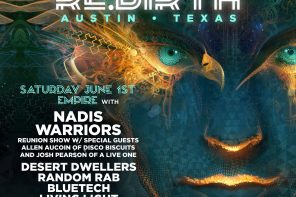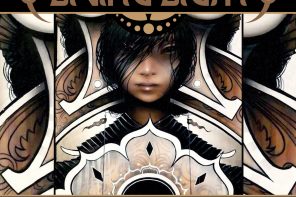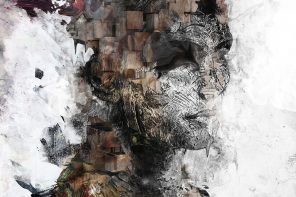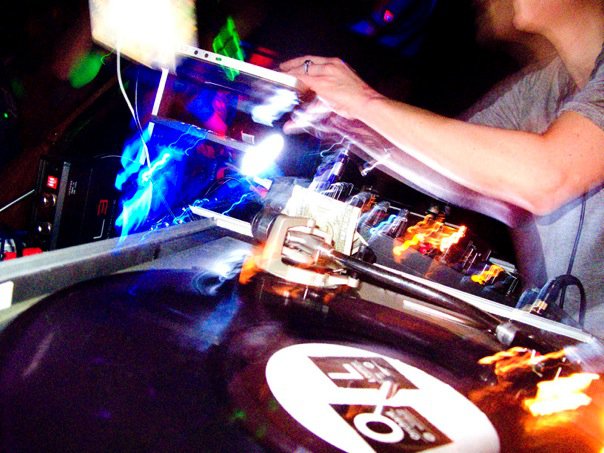Wes Schwartz (Grimace Federation): I was at the first Lotus show in Philly and it was awesome – besides the band being more well known and having a bigger setup, what’s changed from the early days of Lotus? Musically are there similarities from that era?
Jesse Miller (Lotus & Beard-o-Bees): There are musical threads and ideas that have been at the core of the band since we started Lotus way back when. Groove has always been important to us, so we’ve always looked for ways to keep people dancing while playing and writing melodic music. Ideally that all becomes a cathartic experience for the crowd when we play live.
The venues and crowds definitely contribute to how we write music. In the early days when we would play small bars, coffee houses, and other small venues we had more of a tendency to play extended, spacey, improvised music. It was a way to ease into the spaces, experiment and learn how to play together as a band. When we moved into bigger clubs and theaters we began to perform and write in an ever more concise way that gave the shows more of an immediate impact.
I know that a lot of you are real music fans and go to shows and clubs and buy records and such – does the music you listen to have a big influence on the Lotus sound? What are you listening to now in terms of dance/electronic music?
I wouldn’t say it has a big impact. It is extremely rare that we hear some new record and go about trying to create something that sounds just like it. But, I think in subtle ways, such as the tempos or beats, we are influenced by our current listening habits.
I’ve been into Fourtet (Pink album as well as his FabricLive mix), Siriusmo (everything he puts out is genius), Flying Lotus (Cosmogramma) and digging back into some older gems such as Mr. Oizo’s Analog Worms Attack.
What’s the Lotus relationship with the jam scene in 2012? And to jam music in general?
In some ways Lotus is very close to it. We play extended shows that include group improvisation, we play lots of festivals, employ the idea of an ever-changing setlist. In other ways, I don’t think the band is very close to it. Lotus doesn’t sound like Phish or the Grateful Dead, we don’t try to appropriate hippie culture. I think we have contributed to the convergence of elements of traditional “jam” music with electronic music and are pushing beyond the cliches of “jamband.”
You guys are all from the mid-west and beyond (besides Mike Greenfield) – does that factor into your music in any way?
I’m not really sure if there was that much of a difference between what we were hearing growing up as opposed to other parts of the country. Alternative radio was ubiquitous nationwide at that time. I went to a lot of punk rock shows in Colorado when I was young and I think seeing the pure energy in the performances and the crowd reaction has stayed with me.
Beard-o-Bees Imperfect Grid is just out and is dope. How do those pieces come about? Do you loop a lot?
Imperfect Grid is original music I’ve been crafting in my home studio for the last year. The tracks really revolve around my analog synth collection, my style of crafting beats and production and the arrangement style I’m drawn to. Several of the tracks began as tests of different synthesizers I was learning to program and eventually evolved into a final piece.
Anything specifically influencing that project? What makes something a Beard-o-Bees track vs. a Lotus track?
A Lotus composition needs to include drums and guitar and be playable live. For Beard-o-Bees I tend to use synths and some intricate editing to do things with the beats and synth sounds that can’t be pulled off live in the same way. So, I’ve developed a performance method for Beard-o-Bees that uses grid controllers to play different elements of the music instead of using a keyboard.
Do you think Popular Science is the best party in Philly?
Popular Science has been great. You all [Wes Schwartz and Leon Sonkin] have been bringing in really great, forward-looking producers that go beyond genres and cliches and make very unique music. There are too many concerts, parties, and events that are focused on people having their picture taken or other social aspects, but for Popular Science I think the core idea that the music is going to be great every time really sets it apart. And it doesn’t hurt that it is a short bike ride from my house at Kung Fu Necktie.
How do you get somebody to listen/buy an album as opposed to an mp3? Did you have any themes in mind making this Beard-o-Bees record?
First step is to make an album that is good all the way through. I’m much more apt to listen to an album that works as a whole piece than one that has a killer single and the rest of the album is forgettable. There is so much music being released these days it can be overwhelming keeping up with it. And even though people listen to music all day, most of the time it is background music coming out of terrible speakers and not listened to with any focus. I don’t know how to change that, but I think making music that has subtleties and great sounds is a start.
When did you get involved with electronic music? What were the first electronic records you really dug?
The Orb – Orbilivion was the first electronic album that really blew me away with the textures they created using samples and synths. Daft Punk – Homework came out when I was in high school and that was almost the complete opposite, just great simple dance music with a rock edge. When I first heard the TB-303 breakdown in Da Funk I was hooked.
How do you find the motivation to keep going and keep it fresh?
Artistic drive is difficult, especially when it is your livelihood. I think one method of overcoming the ennui is to keep working on something, even if you don’t think it is good. Many times, that process of going over something leads to something better and the original idea can be scrapped. Overcoming the initial inertia is the only way forward.
Do guitars have a place in modern electronic/dance music?
It can be tricky to use guitars. I think there are plenty of great dance oriented tracks that use guitar, but they tend to be more dance-rock sounding, such as The Rapture, !!!, Ratatat or Trans Am. Guitar is so central to rock music that using it in any type of music almost instantly gives that music more of a rock sound. Often, it helps if guitar sounds like it was sampled from a record and edited.
Why is acid house not more popular these days?
Good question, maybe young people don’t have the attention span for more minimal music, but I think acid house is poised to make some sort of comeback or be re-imagined in a new style.
3 best albums non-electronic albums you’ve purchased? 3 best IPA’s?
Latest vinyl that I’ve been loving: Dirty Projectors – Lo Magellan, Television – Marquee Moon, Charles Mingus – Mingus Ah Um.
Best IPA’s: Ballast Point – Sculpin, Moonlight – Homegrown Fresh Hop, Yards – IPA.
——————————————————————————————————————————————
Lotus hits the North East at the end of this month on November 30th, stopping at the Electric Factory in Philadelphia, PA alongside Grimace Federation. Also catch them in Boston, MA on the 25th of January at the House of Blues, and the next night in New York City on the 26th at Best Buy Theater.
Stay On Point:
Lotus New York City Event Info





